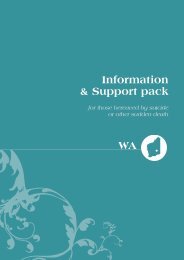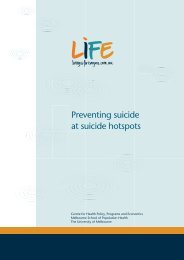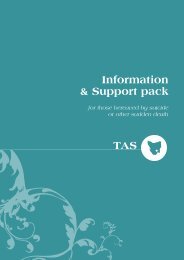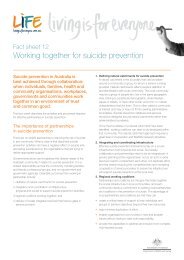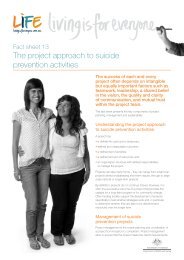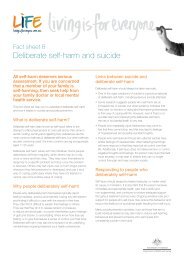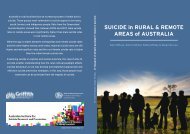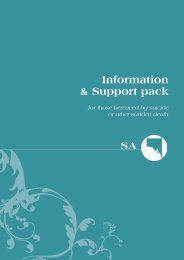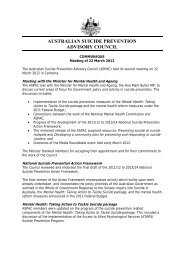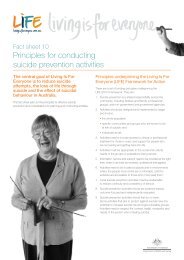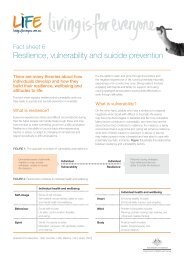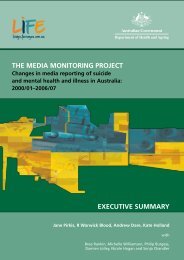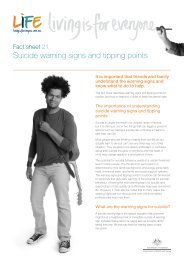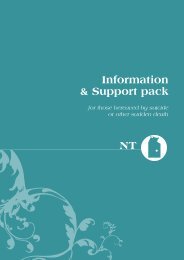Information & Support pack ACT - Living is for Everyone
Information & Support pack ACT - Living is for Everyone
Information & Support pack ACT - Living is for Everyone
Create successful ePaper yourself
Turn your PDF publications into a flip-book with our unique Google optimized e-Paper software.
2 Practical matters2All sudden and unexpected deaths, where a death certificate cannot be <strong>is</strong>sued, are reported to the Coroner<strong>for</strong> investigation in order <strong>for</strong> the nature and cause of death to be determined. If you have any questions at allabout the Coronial process you can contact the Coroner’s Officer or Coroner’s Court.The Coronial ProcessThe Coronial process can be complex and involves the police, the Forensic Medical Centre, Kingston(FMCK), the Coroner’s office and some other agencies. Below <strong>is</strong> a diagram showing the relationshipsbetween the agencies that will work together to ass<strong>is</strong>t the Coroner in determining the nature and cause ofyour loved one’s death.State MortuaryConduct a postmortem (autopsy).Funeral DirectorAt your request willorgan<strong>is</strong>e the funeralservice.PoliceIn<strong>for</strong>m of the death, conductan investigation and provide areport to the coroner.CoronerThe Coroner <strong>is</strong> a mag<strong>is</strong>tratewhose job <strong>is</strong> to make a legalfinding on the nature andcause of any sudden death.Th<strong>is</strong> may be done through aninquiry or an inquest.InquiryMay take 1-3 months and <strong>is</strong> theprocess by which the Coronerreviews the written evidence(police report, post mortem resultsetc.) and makes a finding on thenature and cause of the death.InquestMay take 3-9 months. An inquest<strong>is</strong> a court hearing where witnessesare called to give evidencesurrounding the death. Thecoroner then makes a finding onthe nature and cause ofthe death.What <strong>is</strong> the difference between an inquiry and an inquest?An inquest <strong>is</strong> a court hearing conducted by the Coroner. The Coroner can summon people to be witnessesor to bring papers and other evidence. Evidence <strong>is</strong> given on oath and witnesses can be questioned. TheCoroner must hold an inquest if the person was in a pr<strong>is</strong>on or institution (eg psychiatric hospital). In othercases, the Coroner will decide whether or not an inquest <strong>is</strong> needed. The evidence collected <strong>for</strong> an inquest <strong>is</strong>called the Brief. A copy of the Brief can be made available to appropriate parties on written application to theCoroner. If an inquest <strong>is</strong> not needed the Coroner will review the report written by the police (including witnessstatements, post mortem results etc) and then make a finding on the death. Th<strong>is</strong> <strong>is</strong> called an inquiry.Can I get a death certificate?Once the Coronial Inquiry/Inquest <strong>is</strong> complete the Coroner will <strong>for</strong>ward final in<strong>for</strong>mation to the Reg<strong>is</strong>tryof Births, Deaths and Marriages (telephone 6207 0460, Allara House, Allara Street, Canberra). You canpurchase a death certificate there. Sometimes the funeral director will organ<strong>is</strong>e <strong>for</strong> a copy of the deathcertificate to be <strong>for</strong>warded to you once it <strong>is</strong> available. If a death certificate <strong>is</strong> required earlier an interim deathcertificate can be purchased. Th<strong>is</strong> will show personal details but not the cause of death. Th<strong>is</strong> in<strong>for</strong>mation <strong>is</strong>sufficient <strong>for</strong> most purposes.The FuneralYou will normally be in<strong>for</strong>med of the death of your loved one by a police officer. Once you have beenin<strong>for</strong>med of the death you and your family need to organ<strong>is</strong>e a funeral. You may want to ask a close friendto help with th<strong>is</strong>. If you do not know of a funeral director to use you can check the yellow pages directory oraccess the Australian Funeral Directors Association website at www.afda.org.au. Th<strong>is</strong> website has l<strong>is</strong>tingsof reg<strong>is</strong>tered funeral directors in each state and also a section with frequently asked questions and answersabout funerals and about grief.4



